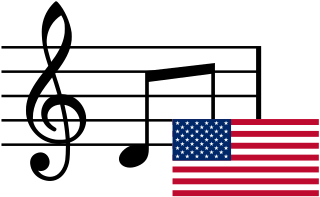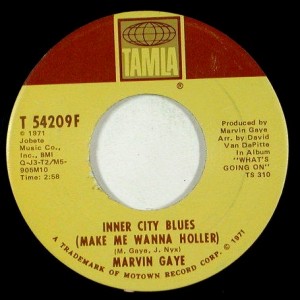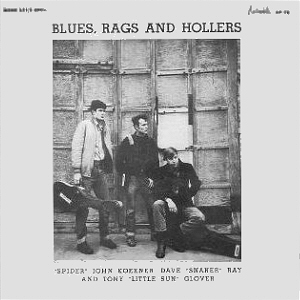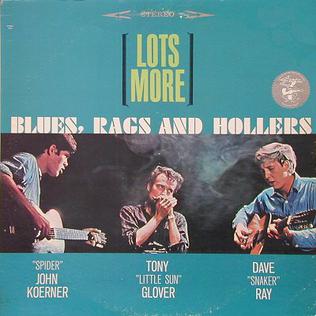Related Research Articles

Blues is a music genre and musical form that originated in the Deep South of the United States around the 1860s. Blues incorporated spirituals, work songs, field hollers, shouts, chants, and rhymed simple narrative ballads from the African-American culture. The blues form is ubiquitous in jazz, rhythm and blues, and rock and roll, and is characterized by the call-and-response pattern, the blues scale, and specific chord progressions, of which the twelve-bar blues is the most common. Blue notes, usually thirds, fifths or sevenths flattened in pitch, are also an essential part of the sound. Blues shuffles or walking bass reinforce the trance-like rhythm and form a repetitive effect known as the groove.

The United States' multi-ethnic population is reflected through a diverse array of styles of music. It is a mixture of music influenced by the music of Europe, Indigenous peoples, West Africa, Latin America, Middle East, North Africa, amongst many other places. The country's most internationally renowned genres are traditional pop, jazz, blues, country, bluegrass, rock, rock and roll, R&B, pop, hip-hop/rap, soul, funk, religious, disco, house, techno, ragtime, doo-wop, folk, americana, boogaloo, tejano, reggaeton, surf, and salsa, amongst many others. American music is heard around the world. Since the beginning of the 20th century, some forms of American popular music have gained a near global audience.
Spirituals is a genre of Christian music that is associated with African Americans, which merged varied African cultural influences with the experiences of being held in bondage in slavery, at first during the transatlantic slave trade and for centuries afterwards, through the domestic slave trade. Spirituals encompass the "sing songs", work songs, and plantation songs that evolved into the blues and gospel songs in church. In the nineteenth century, the word "spirituals" referred to all these subcategories of folk songs. While they were often rooted in biblical stories, they also described the extreme hardships endured by African Americans who were enslaved from the 17th century until the 1860s, the emancipation altering mainly the nature of slavery for many. Many new derivative music genres such as the blues emerged from the spirituals songcraft.
A work song is a piece of music closely connected to a form of work, either one sung while conducting a task or one linked to a task that may be a connected narrative, description, or protest song. An example is "I've Been Working on the Railroad".

Saunders Terrell, known as Sonny Terry, was an American Piedmont blues and folk musician, who was known for his energetic blues harmonica style, which frequently included vocal whoops and hollers and occasionally imitations of trains and fox hunts.
"Gypsy Eyes" or "Gipsy Eyes" is a song written by Jimi Hendrix and performed by the Jimi Hendrix Experience for the 1968 album Electric Ladyland. Subsequently, it was released as the B-side of the "Crosstown Traffic" single, which reached number 52 on the US Billboard Hot 100 and number 37 on the UK Official Singles Chart.
The Memphis Jug Band was an American musical group active from the mid-1920s to the late-1950s. The band featured harmonica, kazoo, fiddle and mandolin or banjolin, backed by guitar, piano, washboard, washtub bass and jug. They played slow blues, pop songs, humorous songs and upbeat dance numbers with jazz and string band flavors. The band made the first commercial recordings in Memphis, Tennessee, and recorded more sides than any other prewar jug band.

"Inner City Blues (Make Me Wanna Holler)", often shortened to "Inner City Blues", is a song by Marvin Gaye, released as the third and final single, and the climactic song from his 1971 landmark album, What's Going On. Written by Gaye and James Nyx Jr., the song depicts the ghettos and bleak economic situations of inner-city America, and the emotional effects these have on inhabitants.
Little is known about the exact origin of the music now known as the blues. No specific year can be cited as its origin, largely because the style evolved over a long period but blues is inarguably a Black American art form as it is noted "it is impossible to say exactly how old blues is - certainly no older than the presence of Negroes in the United States. It is native American Music, the product of the Black in this Country or to put it more exactly the way I have come to think about it, blues could not exist if African Captives had not become American Captives. Ethnomusicologist Gerhard Kubik traces the roots of many of the elements that were to develop into the blues back to the African continent, the "cradle of the blues". One important early mention of something closely resembling the blues comes from 1901, when an archaeologist in Mississippi described the songs of black workers which had lyrical themes and technical elements in common with the blues.

Marvin Gaye Live! is the second live album issued by soul musician Marvin Gaye, released on June 19, 1974, by Tamla Records.

The field holler or field call is mostly a historical type of vocal work song sung by field slaves in the United States to accompany their tasked work, to communicate usefully, or to vent feelings. It differs from the collective work song in that it was sung solo, though early observers noted that a holler, or ‘cry’, might be echoed by other workers. Though commonly associated with cotton cultivation, the field holler was also sung by levee workers, and field hands in rice and sugar plantations. Field hollers are also known as corn-field hollers, water calls, and whoops. An early description is from 1853 and the first recordings are from the 1930s. The holler is closely related to the call and response of work songs and arhoolies. The Afro-American music form ultimately influenced strands of African American music, such as the blues and thereby rhythm and blues, as well as negro spirituals.
Koerner, Ray & Glover was a loose-knit group of three blues musicians from Minneapolis, Minnesota: "Spider" John Koerner on guitar and vocals, Dave "Snaker" Ray on guitar and vocals, and Tony "Little Sun" Glover on harmonica. They were notable figures of the revival of folk music and blues in the 1960s.

Blues, Rags and Hollers is the first album by the American country blues trio Koerner, Ray & Glover, released in 1963.

Lots More Blues, Rags and Hollers is an album by the blues trio Koerner, Ray & Glover, released in 1964.
African blues is a genre of popular music, primarily from West Africa. The term may also reference a putative journey undertaken by traditional African music from its homeland to the United States and back. Some scholars and ethnomusicologists have speculated that the origins of the blues can be traced to the musical traditions of Africa, as retained by African-Americans during and after slavery. Even though the blues is a key component of American popular music, its rural, African-American origins are largely undocumented, and its stylistic links with African instrumental traditions are somewhat tenuous. One musical influence that can be traced back to African sources is that of the plantation work songs with their call-and-response format, and more especially the relatively free-form field hollers of the later sharecroppers, which seem to have been directly responsible for the characteristic vocal style of the blues.
"The World Is Rated X" is a socially conscious song recorded by Marvin Gaye culled from sessions of the shelved You're the Man project from 1972, later issued on the Motown compilation album, Motown Remembers Marvin Gaye: Never Before Released Masters and released as a promotional single in 1986.
"All for the Beatles" is a song written and released in 1964 by Harry Nilsson and John Marascalco. It was released as a single with the alternative title "Stand Up and Holler" under Nilsson's pseudonym Foto-Fi Four and was packaged with a synchronized standard 8 mm film of The Beatles first arriving in the United States in 1964.
The Cash Box Kings is an American blues band from Chicago, Illinois, United States, specializing in Chicago-style blues from the 1940s and 1950s, as well as Delta blues style music from the 1920s and 1930s.
Altered Five Blues Band is an American five-piece blues band. Formed in 2002 in Milwaukee, Wisconsin, United States, they have released six albums since 2008. Their 2021 release, Holler If You Hear Me, reached number three on the US Billboard Top Blues Albums Chart. The current line-up consists of frontman Jeff Taylor, guitarist Jeff Schroedl, bass player Mark Solveson, drummer Alan Arber, plus the returning keyboardist Steve Huebler.
References
- ↑ Alexander, Leslie. M. Rucker, Walter, Jr. eds. Encyclopedia of African American History. ABC-CLIO (2010). ISBN 9781851097746. page 196.